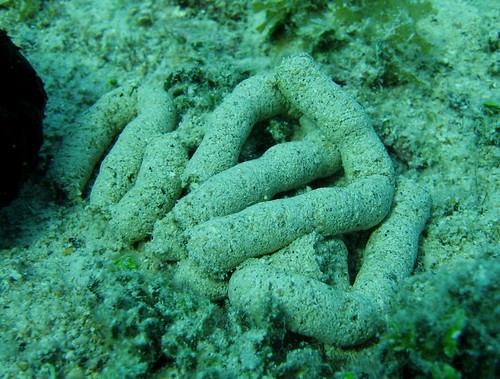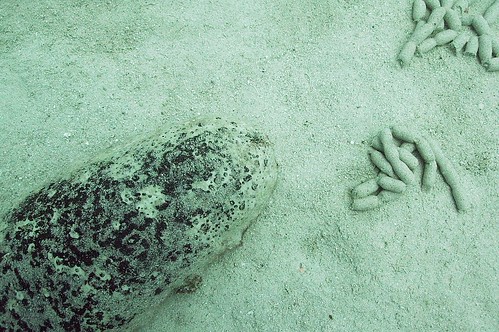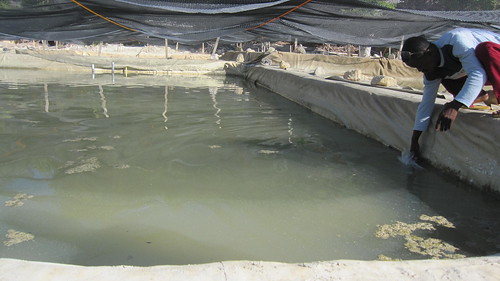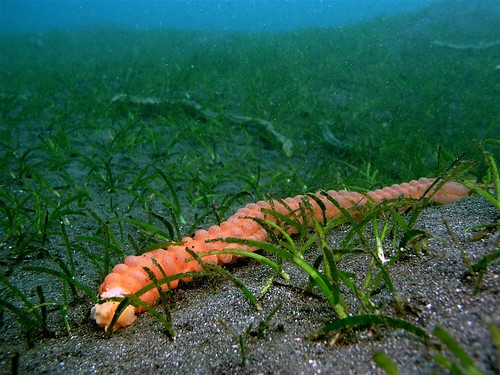 |
| Awesome pic by Mevallee |
I have written about the importance of the poop of other echinoderms in prior posts-particularly this one about green sea urchins (Strongylocentrotus droebchiensis)
Recent research has brought a powerful spotlight on not just the ecological, but the overall, importance of sea cucumbers to the environment. Sea cucumbers occur all over the world and at all depths. Often, when present, they are abundant or at least a significant part of the fauna present.
But the key dynamic present to their importance is that they cycle or process what they eat and what they defecate contributes to the health of the habitat they inhabit.
1. Sea Cucumber poop buffers against ocean acidification on coral reefs
 |
| Image by scuba.linda |
I realize that articles about "coral reefs saved by sea cucumber poop" sound kind of silly on the surface, but read and understand below.... (note also the Journal of Geophysical Research? Important stuff gets put in there.)
Coral has to develop or accumulate calcium carbonate, which is the mineral used to compose coral skeletons, at an equal or better than the rate at which the coral loses calcium carbonate via erosion, natural dissolution, etc.
A survey of the sea cucumbers Stichopus herrmanni and Holothuria lecuospilota in One Tree Reef, Australia showed that the sea cucumbers could digest and dissolve so much of the adjoining sediment and rubble (ie the sand) that they actually contributed up to 50% or MORE of the total amount calcium carbonate dissolved over a night time. Presumably this was made available for coral to use for reef development.
Chemically, calcium carbonate is very alkaline or basic. So, sort of like an antacid. What do you do when you have stomach acids that are misbehaving? Drop some of those tablets to "cancel" out the acidity.
So, sea cucumbers contribute calcium carbonate to the coral reef's "chemical budget". They act like a natural antacid to neutralize other acidic environmental sources. Under normal conditions, there's an equilibirum. The abundance or number of sea cucumbers can affect this.
Thus, in theory, MORE sea cucumbers might produce so MUCH alkalinity (or "basic" poop to the water) that conceivably they could function as a control or at least a buffer against increases in more acidic sea water. This obviously is important when you consider ocean acidification resulting from global warming. Sea cucumber poop is an important part of helping to keep the geochemical balance of a coral reef in equilibrium.
2. Sea Cucumbers EAT tasty bottom poop and clean it up!
Poop is processed into useful nutrients! Over abundance of nutrients (i.e eutrophication) is broken up by sea cucumber feeding!
A recent paper in PLOS one from Thomas MacTavish and colleagues in New Zealand studied a local sea cucumber Australostichopus mollis and how its presence affects the nutrient cycling in its surroundings.
MacTavish and his colleagues studied a nutrient-rich environment covered by algae, mussel feces and other nutirent-rich goodies. Under normal circumstances, these would build up bacteria, ammonia and other factors creating conditions that contribute to the growth of algae, which ultimately chokes everything else out (aka eutrophication).
But you put a sea cucumber into these settings? They LOVE it! They eat and all sorts of good things happen:
- Bacterial abundance increases
- Organic material (i.e., the goo) begins to decompose more quickly
- Organic materials are redistributed from the marine sediments into the water
This has implications....
3. Eating good poop cleans up aquaculture environments
 |
| Image by Jeremy and Christine |
Eutrophication-the overabundance of nutrients resulting in undesirable growth of algae and hypoxia-is a common problem in aquacutlure ponds.
 |
| Image by Smartfish-ioc |
So yes. Sometimes sea cucumbers eat poop. And then poop poop, which is probably "cleaner" than what went in the first place...
4. Sea Cucumber poop is good for plants (mangroves, seagrass, etc.), which are part of a healthy ecosystem
 |
| Image by Eunice Khoo- "Mermate" |
(its a great video, but I didn't enter the description!)
The nutrient cycling role of sea cucumbers has been observed as an important part of ecology. One post I put up awhile back shows that the presence of sea cucumbers leads to more productive sea grass! and thus a more diverse and healthy tropical ecosystem.
Think of them as earthworms! go through the bottom sediments, eat all the organics and leave the sediment.. that's sea cucumber poop!
5. Deep-Sea Cukes have pretty diverse microbial faunas that live in their guts! (and thus their poop!)

Deep-sea sea cucumbers perform very much the same kind of function as the shallow water ones. They live in much finer mud and are often rained upon by nutrients from the surface. Many of these critters, such as Molpadia (shown here) live buried in the mud.
Most of their overall morphology seems devoted to processing mud..in one end and out the other...
We add to that another spin! There are whole microbial faunas that live INSIDE their guts! Go to these past posts to read more about them..
Remember just how abundant these can be in the deep sea. Some occur at a density of 220 individuals per square meter!
How much of this fauna comes out in their poop? How does it contribute to the local environment?
5 comments:
Thanks for this great post! It helped me identify - and appreciate - the "piles of white, sandy rope" I was seeing while snorkeling in Puerto Rico.
Sea Daisies are said the last living Echinoderms discovered.
Are said rather far from all other living Echinoderms.
Please in what are we sure that they do are Echinoderms ?
Roland Paingaud rue des Ecuries 04320 ENTREVAUX FRANCE ro.p@outlook.com
Uh.. I'm not sure why you're asking about sea daisies here. you can read about them more on my blog here:
http://echinoblog.blogspot.com/search?q=xyloplax
that should answer all your questions.
Thank you.
I'm not directly concerned by zoology, but I needed those fresh reliable inquiries.
Excuse approximate English.
Roland Paingaud rue des Ecuries 04320 ENTREVAUX FRANCE ro.p@outlook.com
great post! I am busy studying the One Planet One Ocean MOOC and eutrophication is one of the big concerns -- I have been thinking about the sea cucumber processing aspect for aquaculture but had not thought about the impact sea cucumbers could have on ocean acidification. Fascinating.
Post a Comment